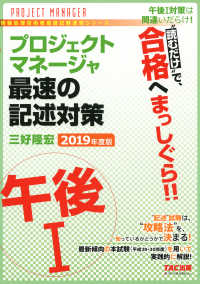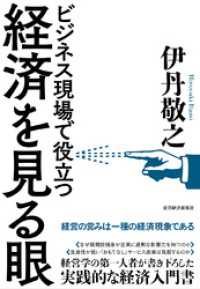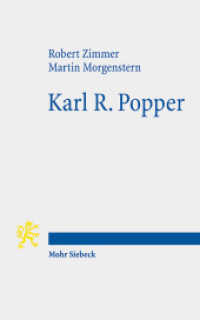- ホーム
- > 洋書
- > ドイツ書
- > Humanities, Arts & Music
- > Linguistics
- > german linguistics
Description
(Short description)
Der erste Teil dieses Buches versammelt Beiträge, die unterschiedliche Bezüge zum Thema Reisen und Wissenschaft sowie Afrika herstellen. Der zweite Teil präsentiert allgemeine Beiträge zur deutschen Literaturwissenschaft, und zwei Interviews mit Thomas Stangl und Philipp Khabo Koepsell runden den Band schließlich ab.
The first part of this volume comprises contributions dealing with different approaches to the theme of travel and science, partly inspired by searches on the African continent. The second part deals with general contributions about German literature. The last part contains two interviews, one with Thomas Stangl and another one with Phlipp Khabo Koepsell.
(Text)
Der erste Teil versammelt Beiträge, die unterschiedliche Bezüge zum Thema Reisen und Wissenschaft sowie Afrika herstellen. Vorgestellt werden zunächst der wenig bekannte Afrikaforscher Emil Holub, sowie Erfahrungen von fünf Afrikanern, die Deutschland und Österreich im 19. Jh. bereisten. Es folgt eine Übersicht zum Afrikakrimi und dem reisenden Detektiv als Ermittlerfigur. Anschließend wird Seyfrieds Roman Herero einer Neubewertung unterzogen. Weitere Beiträge befassen sich mit Volker Brauns Sozialismuskritik in der Nachfolge des Spätaufklärers Wieland, mit der Frage der Adoption in Lessings Nathan der Weise, mit Expeditionsberichten über die Arktis und ihren fiktionalen Vorwegnahmen im 19. und 20. Jh., mit Zafer Senocaks Roman Die Prärie und abschließend mit Hans-Ulrich Treichels Der Papst, den ich gekannt habe von 2007. Der zweite Teil präsentiert allgemeine Beiträge. Untersucht werden Karl Grosses Roman Der Genius, der unveröffentlichte Briefwechsel zwischen dem Verleger des Insel Verlags und Stefan Zweig während des ersten Weltkriegs, Egon Friedells Judastragödie von 1923, Gerhart Hauptmanns autobiographischen Schriften sowie zuletzt Christian Krachts umstrittener Roman Imperium. Zwei Interviews mit Thomas Stangl und Philipp Khabo Koepsell runden den Band ab.
The first part of this volume comprises contributions dealing with different approaches to the theme of travel and science, partly inspired by searches on the African continent. It opens with an article on Emil Holub, a relatively unknown Africa traveller, followed by an article analysing the recorded experiences of Africans travelling Germany and Austria in the nineteenth century. Another article provides an overview over detective novels set in Africa, with the travelling detective as a mediating figure. Seyfried's novel Herero is the subject of a reappraisal. Other contributions deal with Volker Braun's critique of real existing socialism, written in the tradition of the late Enlightenmentcritic Wieland, with the question of adoption in Lessing's Nathan der Weise, with reports of expeditions to the Arctic and its fictional predecessors in the nineteenth and twentieth century, with Zafer Senocak's novel Die Prärie; and finally, with Hans-Ulrich Treichel's 2007 narrative Der Papst, den ich gekannt habe. The second part of this volume presents contributions on Karl Grosse's novel Der Genius, on the unpublished correspondence between Insel publishers and Stefan Zweig during the First World War, on Egon Friedell's Judastragödie of 1923, on Gerhart Hauptmann's autobiographical writings, and on Christian Kracht's controversially received novel Imperium. This volume ends with two interviews, one with Thomas Stangl and another one with Phlipp Khabo Koepsell.
-

- 電子書籍
- “読むだけ”で、合格へまっしぐら!! …
-

- 電子書籍
- 経済を見る眼―ビジネス現場で役立つ






